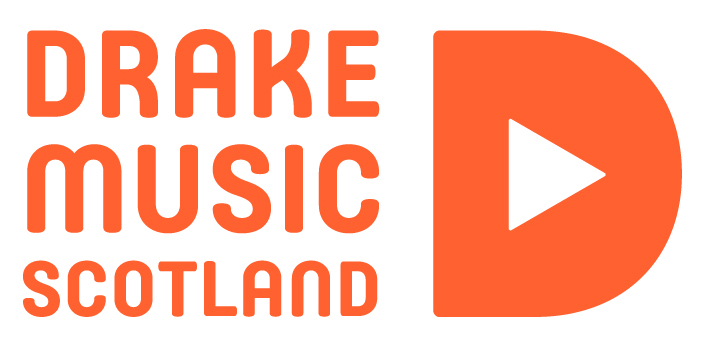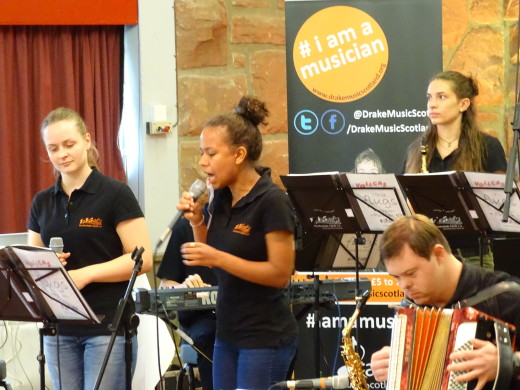Post ISME thoughts from our Chief Executive Thursa Sanderson
IMAGINE THE FUTURE – WHAT WE LEARNED THIS SUMMER
This summer the Drake Scotland team and staff from Edinburgh University’s Reid School of Music hosted the… big breath… International Society for Music Education Pre-Conference Seminar on Special Music Education and Music Therapy. Having thrown down the gauntlet to our UK and international colleagues with our choice of title for the event ‘Imagine the Future: Everyone Plays Music’ we launched into a comprehensive 4-day programme of presentations, workshops and performances. ISME’s conferences are on the academic model so it was important to reflect all areas of research, but we were also keen to make time for those focused discussions on the key topics and burning issues that concern those of us working in the field of music and disability. By the end of the week it was possible to get a sense of some emerging themes for our sector including:
- Progression in learning, teaching and assessment
- New technologies and tools to support disabled musicians
- Professional roles and development of the music educator/ teaching musician
- Socio-cultural aspects and public perceptions of disabled musicians
- Developing audiences for music performed by disabled people
On Day 1 Jonathon Westrup of Drake Music (England) examined how to ‘Create a level playing field’ and assessment of disabled learners’ progress. Next ‘a quantum leap forward in accessible technology’ was led by Barry Farrimond of Open Up Music in Bristol showing us the cutting-edge new instrument ‘the Clarion’. Key insights into good practice using Figurenotes notation came from leading teacher Markku Kaikkonen of Resonaari Music School in Finland. Resonaari’s approach is summed up in a chapter of a new book by Kim McCord and Deborah VanderLinde Blair ‘Exceptional Music Pedagogy for Children with Exceptionalities’ launched at the conference, which contains many fine examples of teaching approaches for those working with students with additional support needs.
‘The best teacher is good music,’ explained Gabriela Ferrari of the Scuola Musicale Giudicarie in northern Italy, outlining on Day 2 the issues faced in training music teachers to work with disabled students and highlighting again that the skills of the good music teacher are evident in the progression and developing musical ambitions of learners. Assessment of developing musical skills clearly takes place in conjunction with evaluation of other wider effects – personal, social, societal – and these impacts were presented in many of the presentations throughout the conference as were health and well-being benefits of music.
‘Inspiration Porn’ was the topic of another fascinating presentation, ‘A Qualitative Analysis of Comments on Music and Persons with Disabilities Found on International YouTube Posts’ by Michelle Hairston of East Carolina University and Alice-Ann Darrow of Florida State, examining reactions to disabled musicians’ musical performances. They found a common tendency to describe disabled musicians as ‘inspirational’ regardless of the quality and aims of the performer, and we discussed the need to develop our critical thinking.
Day 3 began with Jaclyn Paul from Texas Tech University spoke about music in deaf culture and the need for those setting up projects to have sensitivity towards, and consult with, the deaf and hearing impaired community. Sierra Norris, a music therapist from Tucson Arizona, outlined differences between autistic people’s self-perception and how they are viewed, use of terminology about autism, the rise of Autism Speaks and similar movements and the work of Steve Silberman. Erin Parkes from the Lotus Centre in Ontario urged music educators working with people on the autistic spectrum not to hide behind their professional persona but to ‘spend time with autistic people as yourself’. Julie McKenzie based at Hazelwood School for visually impaired pupils in Glasgow outlined their successful approach to developing rounded music education – MusicALL.
Digital Tools ‘I Can Play’
Our Swedish colleage Bo Nilsson, who has already visited us at Drake Music Scotland during 2015, showed some great examples of digital tools being used in the classroom for disabled pupils to gain autonomy, exercise choice and control, ‘mediate their musical intentions’. He waxed lyrical on the need for these learners who put in a huge effort, to be supported to reach their musical potential and for inclusion to be genuine and not tokenistic. This was followed by a fascinating insight from Dr Shirley Salmon of the Orff Institute in Salzburg into the ‘SPIEL, RAUM, MZIK’ (PLAY SPACE MUSIC) creative arts and improvisation approach based on Orff’s work, pushing the boundaries of co-operative interplay between participants and artforms, embracing risk and unpredictability.
The conference succeeded in bringing our sector together and many well-practised and diverse – but complementary – teaching and artistic approaches in support of the disabled learner and developing musician were shared. We thought it was important to have live music being played by musicians with disabilities and ended the conference with demos and performances from Resonaari, Vollgas Connected from Germany, and Kris Halpin and his amazing Mi.Mu gloves as well as our own Digital Orchestra to round off the event.
Links
http://www.helsinkimissio.fi/resonaari/international
http://lotuscentre.net/about-us
http://www.orff.de/en/institutionen/orff-institute.html

